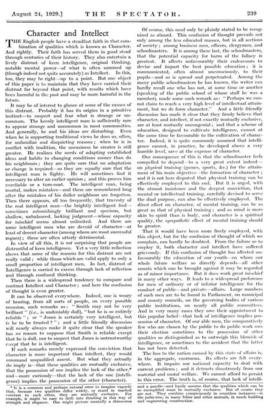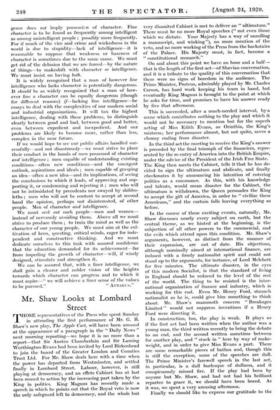Character and Intellect
THE English people have a steadfast faith in that com- bination of qualities which is known as Character. And rightly. Their faith has served them in good stead through centuries of their history. They also entertain a lively distrust of keen intelligence, original thinking, notable mental power—of what is often summed up (though indeed not quite accurately) as Intellect. In this, too, they may be right—up to a point. But one object of this paper is to maintain that they have carried their distrust far beyond that point, with results which have been harmful in the past and may be more harmful in the future.
It may be of interest to glance at some of the causes of this distrust. Probably it has its origins in a primitive instinct—to suspect and fear what is strange or un- common. The keenly intelligent man is sufficiently rare to appear strange and uncommon in most communities. And generally, he and his ideas are disturbing. Even when he is supporting traditional views he does so, often, for unfamiliar and disquieting reasons ; when he is in conflict with tradition, the uneasiness he creates is still greater. He realizes the needs of adapting established ideas and habits to changing conditions sooner than do his neighbours ; they are quite sure that no adaptation or change is required—so they are equally sure that the intelligent man is flighty. He will sometimes find it necessary to alter an earlier opinion ; and this proves him unreliable or a turn-coat. The intelligent man, being mortal, makes mistakes—and these are remembered long after the mistakes of his duller neighbour are forgotten. Then there appears, all too frequently, that travesty of the real intelligent man—the brightly intelligent fool— sometimes astonishingly brilliant and specious, but shallow, unbalanced, lacking judgment—whose capacity for mischief seems almost unlimited. And there are some intelligent men who are devoid of character—at least of decent character (among whom are most successful rogues) ; these are often utterly detrimental.
In view of all this, it is not surprising that people are distrustful of keen intelligence. Yet a very little reflection shows that some of the reasons for this distrust are not really valid ; while those which are valid apply to only a small proportion of intelligent men. In fact, distrust of Intelligence is carried to excess through lack of reflection and through confused thinking.
Then there is a widespread tendency to compare and contrast Intellect and Character ; and here the confusion of thought is even greater.
It can be observed everywhere. Indeed, one is weary of hearing, from all sorts of people, on every possible occasion, such remarks as : "Smith may not be very brilliant" (i.e., is undeniably dull), "but he is so entirely reliable " ; or "Jones is certainly very intelligent, but is he to be trusted ? " ; and a little friendly discussion will nearly always make it quite clear that the speaker has no reason to suppose that Smith is reliable except that he is dull, nor to suspect that Jones is untrustworthy e7cept that he is intelligent.
If such remarks merely expressed the conviction that character is more important than intellect, they would command unqualified assent. But what they actually do imply is—that these qualities are mutually exclusive, that the possession of one implies the lack of the other,* and—more curiously—that the lack of the one (intelli- gence) implies the possession of the other (character).
* It is a common and perhaps natural error to imagine vaguely that, because two qualities differ widely, or stand in marked contrast to each other, they are mutually exclusive.. For example, it might be easy to drift into thinking in this way of strength and elegance. One might picture mentally a rhinoceros Of course, this need only be plainly stated to be recog- nized as absurd. This confusion of thought prevails not only among the less educated masses, but in all sections of society ; among business men, officers, clergymen, and schoolmasters. It is among these last, the schoolmasters, that the potential capacity for harm of the fallacy is greatest. It affects unfavourably their endeavours to devise and impart the best possible education ; it is communicated, often almost unconsciously, to their pupils—and so is spread and perpetuated. Among the many public schoolmasters he has known, the writer can hardly recall one who has not, at some time or another (speaking of the public school of whose staff he was a member), made some such remark as : "Perhaps we can- not claim to reach a very high level of intellectual attain- ment, but we do form character." And a little friendly discussion has made it clear that they firmly believe that character, and intellect, if not exactly mutually exclusive, are at least mutually uncongenial ; and that a scheme of education, designed to cultivate intelligence, cannot at the same time be favourable to the cultivation of charac- ter. Indeed, it is quite commonly assumed that intelli- gence cannot, in practice, be developed above a very humble level, save at the expense of character.
One consequence of this is that the schoolmaster feels compelled to depend—to a very great extent indeed— on physical training (games, sports, &c.) for the attain- ment of his main objective—the formation of character ; and it is not here disputed that physical training can be effectively employed to this end. But it is urged, with the utmost insistence and the deepest conviction, that mental or intellectual training, carefully devised to serve the dual purpose, can also be effectively employed. The direct effect on character, of mental training, can be as great as that of physical training ; and as mind is more akin to spirit than is body, and character is a spiritual quality, the sympathetic effect of mental training should be greater.
That it would have been more freely employed, with this object, but for the confusion of thought of which we complain, can hardly be doubted. From the failure so to employ it, both character and intellect have suffered grievously. If this confusion of thought has affected un- favourably the education of our youth—on whom our whole future welfare so directly depends—all other counts which can be brought against it may be regarded as of minor importance. But it does work great mischief in many other ways. It leads to a widespread preference for men of ordinary or of inferior intelligence for the conduct of public—and private—affairs. Large numbers of such men are to be found in Parliament, on municipal and county councils, on the governing bodies of various public institutions, on nearly all public committees.
And in very many cases they owe their appointment to this popular belief—that lack of intelligence implies pos- session of character. Of our able men, the comparatively few who are chosen by the public to do public work owe their election sometimes to the possession of other qualities so distinguished as to outweigh this blemish of intelligence, or sometimes to the accident that the latter has not been detected.
The loss to the nation caused by this state of affairs is, in the aggregate, enormous. Its effects are felt every- where. It impairs our national capacity to deal with current problems ; and it detracts disastrously from our material and moral welfare. We cannot afford to persist in this error. The truth is, of course, that lack of intelli-
and a gazelle—and hazily assume that the qualities which can be so exemplified must be mutually exclusive. But of course they are not. They combine conspicuously in countless instances—in the palm-tree, in many feline and other animals, in much building and engineering construction.
gence does not imply possesskft of character. Fine character is to be found as frequently among intelligent as among unintelligent people ; possibly more frequently. For if much of the vice and crime and wickedness in the world is due to stupidity—lack of intelligence—it is reasonable to suppose that weakness or baseness of character is sometimes due to the same cause. We must get rid of the delusion that we are forced—by the nature of things—to makeshift with character or intelligence. We must insist on having both.
It is widely recognized that a man of however fine intelligence who lacks character is potentially dangerous. It should be as widely recognized that a man of how- ever fine a character can be equally dangerous (though for different reasons) if—lacking fine intelligence—he essays to deal with the complexities of our modern social and industrial organizations. It will tax the highest intelligence, dealing with these problems, to distinguish clearly between good and bad, between good and better, even between expedient and inexpedient. And our problems are likely to become more, rather than less, complex in the near future.
If we would hope to see our public affairs handled suc- cessfully—and not disastrously—we must strive to place their conduct in the hands of men possessed of character and intelligence ; men capable of understanding existing conditions—often new conditions—and the emergent outlook, aspirations and ideals ; men capable of grasping an idea—often a new idea—and its implications, of seeing the conclusions to which it leads, of approving and sup- porting it, or condemning and rejecting it ; men who will not be intimidated by precedents nor swayed by shibbo- leths; men who will not be content to accept at second hand the opinion, perhaps not disinterested, of other people. Men of character and intelligence.
We must seek out such people—men and women— instead of nervously avoiding them. Above all we must strive to produce them ; to train the mind as well as the character of our young people. We must aim at the cul- tivation of keen, questing, critical minds, eager for inde- pendent and constructive thinking. And we must dedicate ourselves to this task with assured confidence that the education demanded for its achievement—far from impeding the growth of character—will, if wisely designed, stimulate and strengthen it.
We can be assured that, with a finer intelligence, we shall gain a clearer and nobler vision of the heights towards which character can progress and to which it must aspire—" we will achieve a finer sense of the values































 Previous page
Previous page